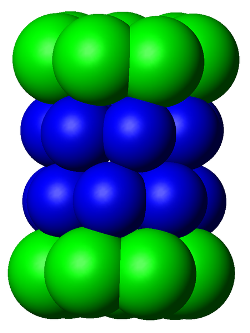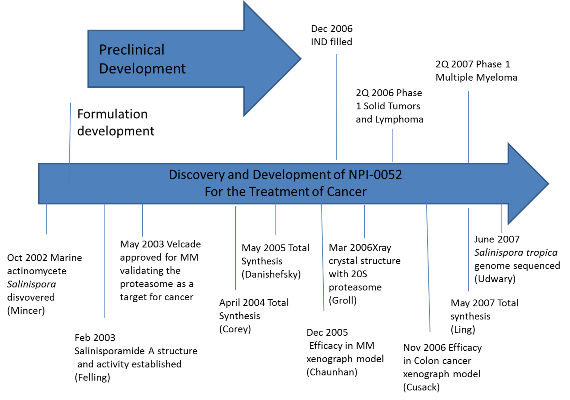
Cancer Treatment and Proteasome Inhibitor
What is one disease that has been very difficult to irradicate in humans? Cancer! Since we have started to research bacterial secondary metabolites many different cancer treatments have been found! Straptomyce platensis is one bacteria (in the same family as Salinispora!) that has been found to have anti-cancer properties.
As this chart from Nereus Pharmaceuticals shows there are new and exciting changes happening in the world of cancer treatment! These advances are thanks to the secondary metabolites produced by Salinispora tropica! Actinomycetes have been known to produce secondary metabolites that are helpful to humans. In fact Bortzemib, the active ingredient in Velcade was also first isolated from an actinomycete. This drug works by completely shutting down the cell's waste transport system. This is great for getting rid of the cancer as it causes apoptosis (cell suicide). Unfortunately, it also causes significant cell death in healthy cells.
The proteasome inhibitor still seems to be the
way to go when fighting cancer. What a proteasome is is an enzyme
substrate complex responsible for the removal of dead or damaged
proteins. Since cancer is essentially a mass of cells that grew too
quickly tumors tends to accumulate large amounts of these damaged
cells, thus requiring a highly functional proteasome inhibitor. This
is where drugs like Velcade or a new one created from
Salinisporamide A come in.
Salinisporamide A is similar to Velcade in that it targets the proteasome, however they target different proteasomes. Velcade targets the 26S proteasome whereas Salinisporamide A targets the 20S proteasome. This seems like it would not be an important difference, however it is the defining difference in how the drug effects your body. Salinisporamide A has been shown to have 100% inhibition of the 20S proteasome without causing the cytotoxicity. Although it is only in phase 1 of clinical trials it is showing great promise in treating a variety of cancers. It's hard to believe that such a powerful drug could have been isolated from somewhere as beautiful as The Bahamas.
The types of cancer this drug is most effective on are the most aggressive forms. Because aggressive cancer cells multiply at such a quick rate they require a very active proteasome. With the addition of this drug the cancer is inhibited from growing since it is unable to get rid of defective and damaged cells.
Below you can listen to Andrew Kale describe the proteasome. Proteasome.mp3 This file is curtesy of Andrew Kale, a graduate student at Scripps Oceanography Institute, La Jolla, Ca.
